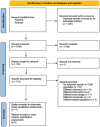Effectiveness of radiotherapy for local control in T3N0 rectal cancer managed with total mesorectal excision: a meta-analysis
- PMID: 36251013
- PMCID: PMC9564357
- DOI: 10.18632/oncotarget.28280
Effectiveness of radiotherapy for local control in T3N0 rectal cancer managed with total mesorectal excision: a meta-analysis
Abstract
Introduction: The total mesorectal excision (TME) significantly improved rectal cancer outcomes. Radiotherapy's benefit in T3N0 rectal cancer patients managed with TME has not been clearly demonstrated. A systematic review and meta-analysis were undertaken to determine whether radiotherapy altered the risk of locoregional recurrence (LR) in T3N0 rectal cancer patients managed with a TME.
Materials and methods: Studies indexed on PubMed or Embase were systematically searched from inception to October 18, 2020. Preferred Reporting Items for Systematic Reviews and Meta-Analyses (PRISMA) guidelines were observed for the literature search, study screening, and data extraction; the Newcastle Ottawa Scale evaluated bias; Grades of Recommendation, Assessment, Development, and Evaluation Working Group system evaluated certainty; and all were performed independently by at least two investigators. Studies that reported LR data specific to T3N0 rectal cancer patients managed with TME, treated with and without radiotherapy, were included. Data was pooled using a random-effects model. Meta-analyses of the relative risk of local recurrence were conducted.
Results: Five retrospective cohort studies involving 932 unique patients reported LR outcomes; no prospective studies met eligibility criteria. Median follow-up ranged from 38.4-78 months. Adjuvant radiotherapy was provided in 3 studies. Chemotherapy was delivered and reported in 4 studies, providing both concurrent and adjuvant chemotherapy. A non-significant LR reduction with radiotherapy alongside TME was estimated, mean relative risk (RR) 0.63 (95% Confidence Interval 0.31-1.29; I2 = 41.8%).
Conclusions: A non-significant LR benefit with radiotherapy's addition was estimated. Meta-analysis of exclusively retrospective cohort studies was concerning for biased results. Adequately powered randomized trials are warranted.
Keywords: meta-analysis; radiotherapy; rectal cancer; systematic review; total mesorectal excision.
Conflict of interest statement
No perceived conflicts of interest are reported. Potential conflicts of interest include Dr. Kucharczyk’s income related to prostate cancer treatment and/or research, including either consultancy fees or honoraria from Abbvie, Ferring Pharmaceuticals, Janssen Pharmaceutica, McKesson, Palette Life Sciences, TerSera Therapeutics, and Verity Pharmaceuticals.
Figures


Similar articles
-
Adjuvant radiotherapy following total mesorectal excision for stage IIA rectal cancer: is it beneficial?Int J Colorectal Dis. 2010 Sep;25(9):1103-10. doi: 10.1007/s00384-010-0970-1. Epub 2010 Jun 11. Int J Colorectal Dis. 2010. PMID: 20544208
-
Adjuvant chemotherapy for rectal cancer patients treated with preoperative (chemo)radiotherapy and total mesorectal excision: a Dutch Colorectal Cancer Group (DCCG) randomized phase III trial.Ann Oncol. 2015 Apr;26(4):696-701. doi: 10.1093/annonc/mdu560. Epub 2014 Dec 5. Ann Oncol. 2015. PMID: 25480874 Clinical Trial.
-
Long-term efficacy of transanal local excision versus total mesorectal excision after neoadjuvant treatment for rectal cancer: A meta-analysis.PLoS One. 2023 Nov 20;18(11):e0294510. doi: 10.1371/journal.pone.0294510. eCollection 2023. PLoS One. 2023. PMID: 37983236 Free PMC article.
-
Laparoscopic total mesorectal excision (TME) for rectal cancer surgery: long-term outcomes.Surg Endosc. 2004 Feb;18(2):281-9. doi: 10.1007/s00464-002-8877-8. Epub 2003 Dec 29. Surg Endosc. 2004. PMID: 14691716 Review.
-
Meta-analysis of oncological outcomes after local excision of pT1-2 rectal cancer requiring adjuvant (chemo)radiotherapy or completion surgery.Br J Surg. 2016 Aug;103(9):1105-16. doi: 10.1002/bjs.10163. Epub 2016 Jun 15. Br J Surg. 2016. PMID: 27302385 Review.
References
-
- Kapiteijn E, Marijnen CA, Nagtegaal ID, Putter H, Steup WH, Wiggers T, Rutten HJ, Pahlman L, Glimelius B, van Krieken JH, Leer JW, van de Velde CJ, and Dutch Colorectal Cancer Group. Preoperative radiotherapy combined with total mesorectal excision for resectable rectal cancer. N Engl J Med. 2001; 345:638–46. 10.1056/NEJMoa010580. - DOI - PubMed
-
- Peeters KC, Marijnen CA, Nagtegaal ID, Kranenbarg EK, Putter H, Wiggers T, Rutten H, Pahlman L, Glimelius B, Leer JW, van de Velde CJ, and Dutch Colorectal Cancer Group. The TME trial after a median follow-up of 6 years: increased local control but no survival benefit in irradiated patients with resectable rectal carcinoma. Ann Surg. 2007; 246:693–701. 10.1097/01.sla.0000257358.56863.ce. - DOI - PubMed
Publication types
MeSH terms
LinkOut - more resources
Full Text Sources
Miscellaneous

